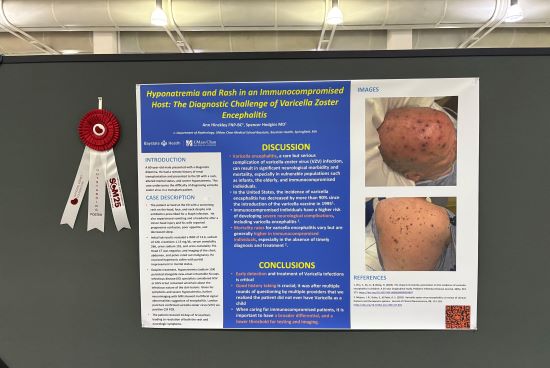
The National Kidney Foundation (NKF) announced the Spring Clinical Meetings 2025 (SCM25) Outstanding Poster honorees. This year, NKF accepted a new record of 603 general abstracts. Four posters received ribbons and prizes during the opening poster exhibition on Friday, April 10.
The recipients of the honors are:
Cojuc-Konigsberg G, Raines N, Chopra B, Caplin B. The impact of heat exposure on kidney transplant outcomes. Abstract #G-559. doi:10.1053/j.ajkd.2025.02.560
Heat stress is a potential risk factor for kidney disease onset and progression, and kidney transplant recipients might be more susceptible to heat-related kidney damage. This study evaluated the impact of ambient heat exposure on kidney transplant outcomes in the United States, finding that higher heat exposure was significantly associated with modest progressive kidney function decline and increased risk for major adverse kidney events compared with lower heat exposure.
Sledge R, Schatell D. Well-being and self-management of ESKD patients in an online health community. Abstract #SW-04.
This study identified the sources of emotional and informational support patient members find in online health communities and how the type of support influences patient well-being and self-management.
Ceylan J, Laborade JA, Andrade J. The influence of dietary inflammatory index and food security status on estimated glomerular filtration rate. Abstract #G-526. doi:10.1053/j.ajkd.2025.02.527
Positing that food security status and dietary habits may affect kidney function, this study investigated the influence of those factors on estimated glomerular filtration rate (eGFR). The researchers discovered that individuals with a higher dietary inflammatory index and greater food insecurity experienced a more significant decline in eGFR.
Hinckley A, Hodgins S. Hyponatremia and rash in an immunocompromised host: the diagnostic challenge of varicella zoster encephalitis. Abstract #G-116. doi:10.1053/j.ajkd.2025.02.117
This case study highlighted a 60-year-old male with a remote history of renal transplantation who presented with a rash, altered mental status, and severe hyponatremia, creating a diagnostic dilemma that underscores the difficulty of verifying varicella zoster virus infection in a transplant recipient.







 © 2025 Mashup Media, LLC, a Formedics Property. All Rights Reserved.
© 2025 Mashup Media, LLC, a Formedics Property. All Rights Reserved.